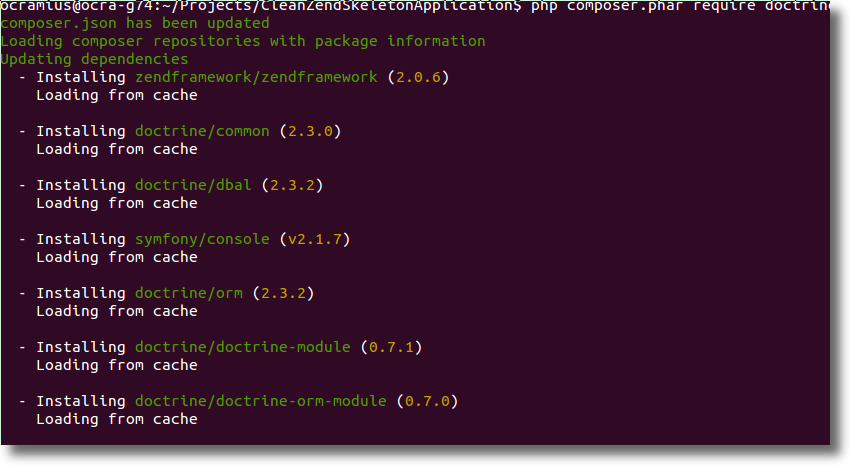 Marco Pivetta
Marco Pivetta
 Ocramius
Ocramius
 octrine team
octrine team
 contributor
contributor

 Ocramius
Ocramius
Current projects
ProxyManager, BjyAuthorize, AssetManager, ZeffMu, ZfrRest, OcraDiCompiler, OcraServiceManager, OcraCachedViewResolver, DoctrineModule, DoctrineORMModule, DoctrineMongoODMModule, VersionEyeModule
WHY?

Doctrine 2 & ZF2
 +
+

Doctrine Project
An incubator for persistence-oriented libraries
What is Doctrine ORM?
Doctrine ORM is an Object Relational Mapper
It is inspired by Hibernate and the JPA (JSR-317)
It is based on a DBAL (DataBase Abstraction Layer)
Allows developers to save and load POPO with SQL
An ORM gives you the impression that you are working with a "virtual" graph composed by objects...
... backed by any persistence layer!
Simpler:
Forget the database!
Doctrine works with simple objects (POPO)
Objects with an identifier are defined as Entities
namespace Application\Entity;
use Doctrine\ORM\Mapping as ORM;
/** @ORM\Entity */
class User {
/**
* @ORM\Id
* @ORM\GeneratedValue(strategy="AUTO")
* @ORM\Column(type="integer")
*/
protected $id;
/** @ORM\Column(type="string") */
protected $name;
// getters/setters
}Everything OK so far?
php public/index.php orm:validate-schema

Generate the database
php public/index.php orm:schema-tool:create

$objectManager = \Doctrine\ORM\EntityManager::create(/* yadda */);$objectManager = \Doctrine\ORM\EntityManager::create(/* yadda */);
$user = new \Application\Entity\User();
$user->setName('Zaphod Beeblebrox');
$objectManager->persist($user);
$objectManager->flush();
var_dump($user->getId());ಠ_ಠ
Persisting an object
$user = new \Application\Entity\User();
$user->setName('Arthur Dent');
$objectManager->persist($user); // $user is now "managed"
$objectManager->flush(); // commit changes to db
var_dump($user->getId()); // 1Loading an object
$ford = $objectManager
->getRepository('Application\Entity\User')
->findOneBy(array('name' => 'Ford Prefect'));Updating an object
$marvin = $objectManager
->getRepository('Application\Entity\User')
->findOneBy(array('name' => 'Marvin'));
$marvin->setName('Marvin the Paranoid Android');
$objectManager->flush();Deleting an object
$president = $objectManager
->getRepository('Application\Entity\User')
->findOneBy(array('name' => 'Zaphod Beeblebrox'));
$objectManager->remove($president);
$objectManager->flush();Associations
namespace Application\Entity;
use Doctrine\ORM\Mapping as ORM;
/** @ORM\Entity */
class Address {
/**
* @ORM\Id
* @ORM\GeneratedValue(strategy="AUTO")
* @ORM\Column(type="integer")
*/
protected $id;
/** @ORM\Column(type="string") */
protected $country;
// getters/setters
}class User {
// ...
/** @ORM\ManyToOne(targetEntity="Address") */
protected $address;
// ...
}$user = new User();
$user->setName('Arthur Dent');
$objectManager->persist($user);
$address = new Address();
$address->setCountry('UK');
$objectManager->persist($address);
$user->setAddress($address);
$objectManager->flush();$user = $objectManager
->getRepository('Application\Entity\User')
->findOneBy(array('name' => 'Arthur Dent'));
echo $user->getAddress()->getCountry(); // UKclass User {
// ...
/** @ORM\ManyToMany(targetEntity="User") */
protected $friends;
public function __construct() {
$this->friends = new \Doctrine\Common\Collections\ArrayCollection();
}
// ...
}$arthur = new User();
$arthur->setName('Arthur Dent');
$objectManager->persist($arthur);
$trillian = new User();
$trillian->setName('Tricia Marie McMillan');
$objectManager->persist($trillian);
$zaphod = new User();
$zaphod->setName('Zaphod Beeblebrox');
$objectManager->persist($zaphod);
$arthur->getFriends()->add($trillian);
$trillian->getFriends()->add($zaphod);
$objectManager->flush();$arthur = $objectManager
->getRepository('Application\Entity\User')
->findOneBy(array('name' => 'Arthur Dent'));
foreach ($arthur->getFriends() as $friend) {
echo $friend->getName() . "\n";
}Note: Trillian doesn't see Arthur as a friend
Note2: Zaphod doesn't see Trillian as a friend
Doctrine ORM + Zend Framework 2
The Modules!
DoctrineModule
basic common functionality
DoctrineORMModule
ORM/SQL Connection
DoctrineMongoODMModule
ODM/MongoDB Connection
Installation!
php composer.phar require doctrine/doctrine-orm-module:0.7.*

php composer.phar require zendframework/zend-developer-tools:dev-master
Enabling the modules
config/application.config.phpreturn [
'modules' => [
'ZendDeveloperTools',
'DoctrineModule',
'DoctrineORMModule',
'Application',
],
// [...]
];Configure mappings
module/Application/config/module.config.phpreturn [
'doctrine' => [
'driver' => [
'application_entities' => [
'class' =>'Doctrine\ORM\Mapping\Driver\AnnotationDriver',
'cache' => 'array',
'paths' => [__DIR__ . '/../src/Application/Entity']
],
'orm_default' => [
'drivers' => [
'Application\Entity' => 'application_entities'
]
]]], // [...]Configure connection
config/autoload/doctrine.local.phpreturn [
'doctrine' => [
'connection' => [
'orm_default' => [
'driverClass' =>'Doctrine\DBAL\Driver\PDOMySql\Driver',
'params' => [
'host' => 'localhost',
'port' => '3306',
'user' => 'username',
'password' => 'password',
'dbname' => 'database',
]]]]];Test it!
module/Application/src/Application/Controller/IndexController.phppublic function indexAction() {
$objectManager = $this
->getServiceLocator()
->get('Doctrine\ORM\EntityManager');
$user = new \Application\Entity\User();
$user->setFullName('Slartibarfast');
$objectManager->persist($user);
$objectManager->flush();
die(var_dump($user->getId()));
}DoctrineModule
goodies
EER UML model
See what your entities look like in a graph:

Paginator Adapter
use Doctrine\Common\Collections\ArrayCollection;
use DoctrineModule\Paginator\Adapter\Collection as Adapter;
use Zend\Paginator\Paginator;
// Create a Doctrine Collection
$collection = new ArrayCollection(range(1, 101));
// Create the paginator itself
$paginator = new Paginator(new Adapter($collection));
$paginator
->setCurrentPageNumber(1)
->setItemCountPerPage(5);ORM Paginator Adapter
use DoctrineORMModule\Paginator\Adapter\DoctrinePaginator;
use Doctrine\ORM\Tools\Pagination\Paginator as ORMPaginator;
use Zend\Paginator\Paginator;
// Create a Doctrine Collection
$query = $em->createQuery('SELECT u FROM User u JOIN u.friends f');
// Create the paginator itself
$paginator = new Paginator(
new DoctrinePaginator(new ORMPaginator($query))
);
$paginator
->setCurrentPageNumber(1)
->setItemCountPerPage(5);Object-Exists Validator
$repository = $objectManager
->getRepository('Application\Entity\User');
$validator = new \DoctrineModule\Validator\ObjectExists([
'object_repository' => $repository,
'fields' => ['email'],
]);
var_dump($validator->isValid('test@example.com'));
var_dump($validator->isValid(['email' => 'test@example.com']));Cache bridges
$zendCache = new \Zend\Cache\Storage\Adapter\Memory();
$cache = new \DoctrineModule\Cache\ZendStorageCache($zendCache);$doctrineCache = new \Doctrine\Common\Cache\ArrayCache();
$options = new \Zend\Cache\Storage\Adapter\AdapterOptions();
$cache = new \DoctrineModule\Cache\DoctrineCacheStorage(
$options,
$doctrineCache
);Hydrator
use DoctrineModule\Stdlib\Hydrator\DoctrineObject;
$hydrator = new DoctrineObject($objectManager, 'Application\Entity\City');
$city = new City();
$data = array('name' => 'Béziers');
$city = $hydrator->hydrate($data, $city);
echo $city->getName(); // prints "Béziers"
$dataArray = $hydrator->extract($city);
echo $dataArray['name']; // prints "Béziers"Form Elements
$form->add([
'type' => 'DoctrineModule\Form\Element\ObjectSelect',
'name' => 'user',
'options' => [
'object_manager' => $objectManager,
'target_class' => 'Module\Entity\User',
'property' => 'fullName',
'is_method' => true,
'find_method' => [
'name' => 'findBy',
'params' => array(
'criteria' => ['active' => 1],
'orderBy' => ['lastName' => 'ASC'],
],
],
],
]);More stuff!
Works with MongoDB ODM too!
CouchDB ODM / PHPCR ODM / OrientDB ODM
Good Practices
Entities are simple
Data, keep them simple!
No logic, just simple checks
Only aware only of themselves + associations
doctrine/common API
If you stick with using only doctrine/common API,
you can switch between
ORM /
MongoDB ODM / CouchDB ODM /
PHPCR ODM / OrientDB ODM
Instead of
Doctrine\ORM\EntityManageruse
Doctrine\Common\Persistence\ObjectManagerInstead of
Doctrine\ORM\EntityRepositoryuse
Doctrine\Common\Persistence\ObjectRepositoryCollections
Doctrine comes with a powerful collections API
OOP API for array-like data structures
Criteria API
Collections provide a Criteria API
Abstracts the problem of "searching"
Filter virtually any kind of data structure
Criteria API example
use Doctrine\Common\Collections\Criteria;
use Doctrine\Common\Collections\ArrayCollection;
$collection = new ArrayCollection(array($user1, $user2, $user3));
$criteria = new Criteria();
$criteria->andWhere(
$criteria->expr()->gt(
'lastLogin',
new \DateTime('-1 day')
)
);
$recentVisitors = $collection->matching($criteria);$recentVisitors = $em
->getRepository('Application\Entity\Users')
->matching($criteria);Works in ORM Repositories, Collections, etc...
Same criteria for different persistence layers (ORM, ODM, Memory, ElasticSearch, cache...)
Criteria objects make code readable!
Allows you to define your own RecentUsersCriteria or InactiveUsersCriteria...
$frequentVisitors = $em
->getRepository('Application\Entity\Users')
->matching(new FrequentVisitorsCriteria());Inject Object Manager
Use Dependency Injection, luke!
class MyService {
public function __construct(ObjectManager $objectManager) {
// [...]
}
}'factories' => [
'my_service' => function ($serviceLocator) {
$objectManager = $serviceLocator->get('Doctrine\ORM\EntityManager');
return new MyService($objectManager);
}
],Keep Object Manager out of Controllers

Don't use persistence to solve service layer problems
Filtering data when saved to DB
Validating data when saved to DB
Saving files when records are saved to DB
Using DB-level errors to check input validity
Keep your object graph valid
An ObjectManager works under the assumption that managed objects are valid!
Assign values to your entities only when data is valid!